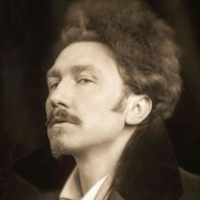Provincia Deserta
At Rochecoart,
Where the hills part
in three ways,
And three valleys, full of winding roads,
Fork out to south and north,
There is a place of trees . . . gray with lichen.
I have walked there
thinking of old days.
At Chalais
is a pleached arbour;
Old pensioners and old protected vomen
Have the right there
it is charity.
I have crept over old rafters,
peering down
Over the Dronne,
over a stream full of lilies.
Eastward the road lies,
Aubeterre is eastward,
With a garrulous old man at the inn.
I know the roads in that place:
Mareuil to the north-east,
La Tour,
There are three keeps near Mareuil,
And an old woman,
glad to hear Arnaut,
Glad to lend one dry clothing.
I have walked
into Perigord,
I have seen the torch-flames, high-leaping,
Painting the front of that church;
Heard, under the dark, whirling laughter.
I have looked back over the stream
and seen the high building,
Seen the long minarets, the white shafts.
I have gone in Ribeyrac
and in Sarlat,
I have climbed rickety stairs, heard talk of Croy,
Walked over En Bertran’s old layout,
Have seen Narbonne, and Cahors and Chalus,
Have seen Excideuil, carefully fashioned.
I have said:
‘Here such a one walked.
‘Here Cceur-de-Lion was slain.
‘Here was good singing.
’Here one man hastened his step.
‘Here one lay panting.’
I have looked south from Hautefort,
thinking of Montaignac, southward.
I have lain in Rocafixada,
level with sunset,
Have seen the copper come down
tingeing the mountains,
I have seen the fields, pale, clear as an emerald,
Sharp peaks, high spurs, distant castles.
I have said: The old roads have lain here.
‘Men have gone by such valleys
‘Where the great halls were closer together.’
I have seen Foix on its rock, seen Toulouse, and
Aries greatly altered,
I have seen the ruined 'Dorata’.
I have said:
‘Riquier! Guido.’
I have thought of the second Troy,
Some little prized place in Auvergnat:
Two men tossing a coin, one keeping a castle,
One set on the highway to sing.
He sang a woman,
Auvergne rose to the song;
The Dauphin backed him.
‘The castle to Austors!’
‘Pieire kept the singing
‘A fair man and a pleasant.’
He won the lady,
Stole her away for himself, kept her against armed force:
So ends that story.
That age is gone;
Pieire de Maensac is gone.
I have walked over these roads;
I have thought of them living.

